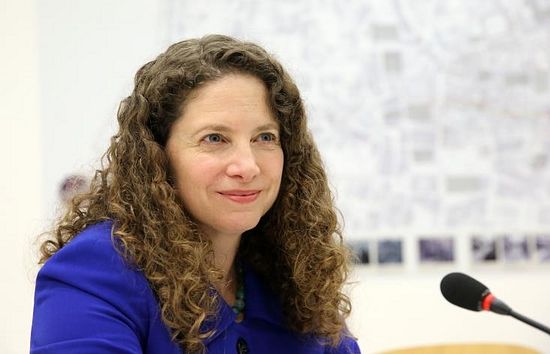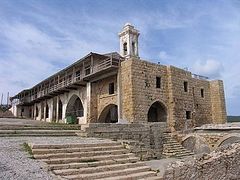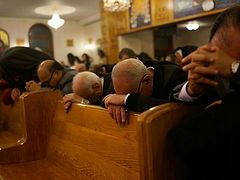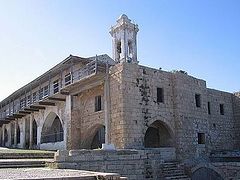Source: Cyprus News Agency
June 2, 2016
UN Special Rapporteur on cultural rights Karima Bennoune criticized on Thursday the "unjustified restrictions" the Turkish Cypriot side has recently announced regarding access to religious sites for churchgoers in the northern, Turkish-occupied part of Cyprus.
She added, however, that her understanding after meeting with the so-called foreign minister in the occupied part of the island, was that there has been a retraction of additional restrictions, that aimed to limit access to religious ceremonies once a year.
These restrictions did not apply to the monasteries of Apostolos Barnabas, Apostolos Andreas and Ayios Mamas, all in Turkish-occupied part of Cyprus.
"I am deeply concerned about the possible violations of cultural rights and the rights of religious freedom that may result from any such restrictions," said Bennoune, while addressing a press conference, in the Nicosia buffer zone, at the end of her ten day fact-finding mission to Cyprus. She added that "there is a move back now to the preexisting status quo, as I understand it".
The human rights expert conceded however that there is still a lot of uncertainty on how this retraction is going to be interpreted and implemented, and called on the Turkish Cypriot side "to be as clear as possible about the current situation".
"Cultural rights are not a bargaining chip" Bennoune went on, while underlining that "ordinary people that wish to take part in religious ceremonies have a human right and cultural right to do so". As she put it "carrying out politics via restrictions on cultural rights is entirely unacceptable".
The UN Special rapporteur also said she wished no similar attempt for restrictions will be made in the future and underlined the harm that has already been caused, simply by the announcement of possible restrictions, "even though they seem to have been rolled back".
Bennoune also called on the authorities of the Republic of Cyprus not to proceed with any retaliatory measures. "Retaliation in the area of cultural rights is not permitted" she said and noted that ordinary people should not be held responsible for policies that are beyond their control.
According to the independent expert to the UN, original restrictions still need to be interpreted in accordance with international standards. She added that limitations to cultural rights are possible under international law, but should be a last resort only and in accordance with certain conditions.
Bennoune, who published on Thursday her preliminary conclusions and observations on her visit to Cyprus, pending her comprehensive report to the UN Human Rights Council in March 2017, said her recommendations should be taken as a whole.
In this context, she underlined that there are administrative issues that also need to be carefully addressed in the Republic of Cyprus, although they are quite distinct from the issues in the northern, occupied part, both in magnitude and in nature.
Such issues do not concern restrictions but rather "de facto limitations" in accessing cultural heritage sites, as she put it. Bennoune suggested that the Cypriot government increased awareness on how to gain access in these sites, such as cemeteries.
During her first fact-finding mission to Cyprus, the UN Special rapporteur visited various religious sites and monuments, archeological sites and abandoned villages. She paid a visit to the monasteries of Apostolos Barnabas and Apostolos Andreas, the Ayia Sofia mosque in Pafos and the Hala Sultan Tekke in Larnaca, as well as Famagusta and the Turkish-occupied Maronite village of Ayia Marina.
The UN Special rapporteur expressed appreciation of the work of the bicommunal Technical Committees on Cultural Heritage, Culture and Gender. Their work is a model for other countries and they need international and financial support, she said.
According to Bennoune, activities to protect cultural heritage "have to be taken seriously, they are not optional activities, they are absolutely critical and vital functions to guarantee the human rights of all and indeed they are a key to unlocking the full solution that we hope to see".
Bennoune highlighted the poor condition of some churches and monuments in the northern part of Cyprus and said that cultural heritage can not wait."This is an issue that needs to be dealt with now" since some sites are deteriorating rapidly. If the pace of restoration does not increase, it will take a hundred years to restore it all, and some things may be irreparably lost, she noted.
The expert also referred to some of her recommendations to Cyprus, including the creation of a dedicated Ministry of Culture or Cultural Heritage in the future, or at least of a structure that would allow constant communication and consultation between various departments that deal with these issues.
She also noted that Cyprus should proceed with the ratification of the Optional Protocol to the International Covenant on Economic, Social and Cultural Rights and the International Convention on the Rights of Migrant Workers and their Families.
The human rights expert also observed that the bi-communal framework, used to assess cultural rights in Cyprus, can be very positive for reconciliation between the two largest groups, Greek Cypriots and Turkish Cypriots, but is insufficient to characterize the complexity of today`s diverse society.
She said finally that it was critical to hear more of the voices of tolerance all over Cyprus, which reflect a broad sector of society. They need to be heard clearly and loudly, so that they are louder than the voices of intolerance, she concluded.
Cyprus has been divided since 1974, when Turkish troops invaded and occupied its northern third. Peace talks are currently underway to find a negotiated settlement that will reunite the country, under a federal roof.





It’s an absolute disgrace.